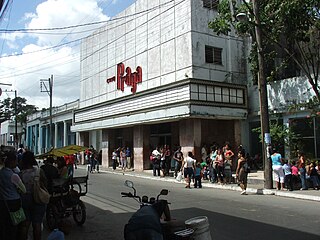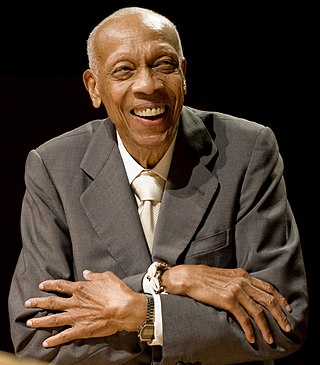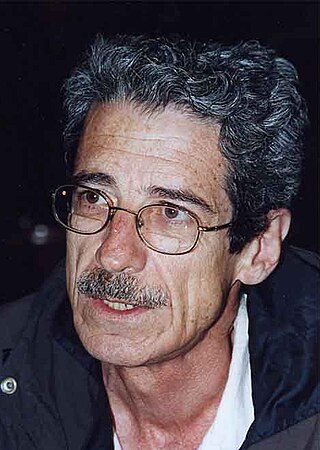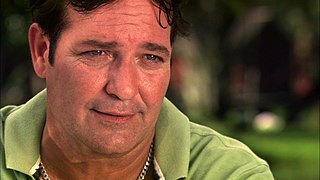
Cinema arrived in Cuba at the beginning of the 20th century. Before the Cuban Revolution of 1959, about 80 full-length films were produced in Cuba. Most of these films were melodramas. Following the revolution, Cuba entered what is considered the "Golden age" of Cuban cinema.
Tomás Gutiérrez Alea was a Cuban film director and screenwriter. Gutiérrez Alea wrote and directed more than twenty features, documentaries, and short films, which are known for his sharp insight into post-Revolutionary Cuba, and possess a delicate balance between dedication to the revolution and criticism of the social, economic, and political conditions of the country.

Dionisio Ramón Emilio Valdés Amaro, better known as Bebo Valdés, was a Cuban pianist, bandleader, composer and arranger. He was a central figure in the golden age of Cuban music, especially due to his big band arrangements and compositions of mambo, chachachá and batanga, a genre he created in 1952.

Miguel Coyula Aquino is a Cuban filmmaker and writer. Working with a multi-disciplinary approach, his films usually take several years to complete. He has been described by critics as a virtuoso and an innovator. The multi-layered narratives of his films often deal with alienation, they contain graphic depictions of sexuality, and frontal criticism of society and politicians. The controversial nature of his work has resulted in the banning of his work in Cuba, although it has also suffered censorship in Argentina, Belarus, Morocco, and Beirut. The press usually refers to him as the enfant terrible of Cuban Cinema.

Fernando Pérez Valdés is a prominent Cuban film director.

Historias mínimas is a 2002 Argentine drama film directed by Carlos Sorín and written by Pablo Solarz. The film was produced by Martin Bardi, Leticia Cristi, and José María Morales. It features, among others, Javier Lombardo, Antonio Benedicti and Javiera Bravo.

The Havana Film Festival is a Cuban festival that focuses on the promotion of Latin American filmmakers. It is also known in Spanish as Festival Internacional del Nuevo Cine Latinoamericano de La Habana, and in English as International Festival of New Latin American Cinema of Havana. It takes place every year during December in the city of Havana, Cuba.

Pavel Giroud is a Cuban film director based in Madrid, Spain.
90 Miles is a 2001 documentary film written and directed by Juan Carlos Zaldívar. The film is a recounting of the events that lead Zaldívar to become a Marielito and leave Cuba for a better life in Miami. It premiered in 2003 on PBS as part of its P.O.V. series. It won the award for Best Documentary at the New York International Latino Film Festival and it won two awards at the Havana Film Festival also known in Spanish as Festival Internacional del Nuevo Cine Latinoamericano de La Habana in Havana, Cuba in 2001: the Black Coral, First Prize, for Best Documentary and the Memoria Documentary Award. 90 Miles was also awarded the Media History Award by the Wolfson family Media History Center in Miami, Florida that year. 90 Miles recounts the strange twist of fate that took Juan Carlos Zaldívar across one of the world's most treacherous stretches of water. It is a journey of a family in search for healing and understanding. IndieWire called 90 miles "Probing and thoughtful." Zaldívar uncovers the emotional distance opened in thousands of families by the 90 miles between the U.S. and Cuba.
Juan Carlos Tabío was a Cuban film director and screenwriter. His film Strawberry and Chocolate (1994), which he co-directed with Tomás Gutiérrez Alea, won a Silver Bear - Special Jury Prize at the 44th Berlin International Film Festival. He was also nominated for the Academy Award for Best Foreign Language Film. He collaborated with director and close friend Tomás Gutiérrez Alea and actors Jorge Perugorría, Vladimir Cruz and Mirta Ibarra in several films.

Jorge Perugorría Rodríguez is a Cuban actor, film director and painter. He is well known for his part as Diego in Strawberry and Chocolate (original title in Spanish Fresa y chocolate. He recently acted in Steven Soderbergh's Che, with Benicio del Toro and in the original Netflix series Four Seasons in Havana. He lives in Santa Fe, a neighborhood on the outskirts of Havana, with his wife Elsa Maria Fuentes de La Paz and their four children.
Juan Carlos Cremata Malberti is a Cuban film director. He started his career as an author and actor for children's TV shows made for the Cuban Institute of Radio and Television from 1981 to 1987. He is known for directing the movie Viva Cuba, which received the Best Children's Film award at the Cannes International Film Festival in 2005.
Lissette Solórzano is a professional photographer born in Santiago de Cuba in 1969. She has worked as a medical photographer, photojournalist, photo curator and graphic designer. She has won many prizes – such as the “Photographic Essay Prize” of the Casa de las Américas - and her work has been exhibited in museums and galleries throughout Cuba as well as in Mexico, in England and in the United States. She is also a member of the Cuban Writers and Artists Union (UNEAC).
Havana, Cuba, is a host city to numerous events and festivals.

Beatriz Flores Silva is an Uruguayan - Belgian film director, film producer, screenwriter and teacher. Her films include The Seven Deadly Sins (1990), The Almost True Story of Pepita the Gunslinger (1992), In This Tricky Life (2001), and Masangeles (2008).

J. Michael Seyfert is a German Mexican documentary film director best known for the documentaries Rent a Rasta and Bye Bye Havana. Among other awards, at the Atlanta International Documentary Film Festival, Seyfert was awarded Best Post-Production for Bye Bye Havana in 2006, and Best Director for Rent a Rasta in 2007.
Gloria Victoria Rolando Casamayor, known as Gloria Rolando, is a Cuban filmmaker and screenwriter. Her career as a director spans more than 35 years at the Cuban national film institute ICAIC, and she also heads Imágenes del Caribe, an independent film-making group. Her films, such as Reshipment (2014), characteristically document the history of people of the African diaspora.

Ernesto Daranas Serrano is a Cuban filmmaker. Daranas' three feature films have had unprecedented success in Cuba and were submitted to the Academy Award for Best International Feature Film. Daranas is a Latin Grammy nominee for Best Long Form Music Video and a recipient of the King of Spain Award. His filmography includes Sergio & Sergei (2017), starring Ron Perlman, and Behavior, often considered the greatest Cuban film of the 21st century.
The Havana Film Festival New York (HFFNY) is a film festival, based in New York City, that screens cinema from across Latin America with a special focus on Cuba and its film industry. It is a project of The American Friends of the Ludwig Foundation of Cuba, a 501(c)(3) tax-exempt organization with the mission of building cultural bridges between the United States and Cuba through arts projects.

Habaneceres is a Cuban documentary film, directed in 2001 by Luis Leonel León. The documentary received awards at film festivals and was selected by the Cuban Film Press Association, affiliated with the International Federation of Film Press (FIPRESCI), as the best film of 2001 in its genre.













